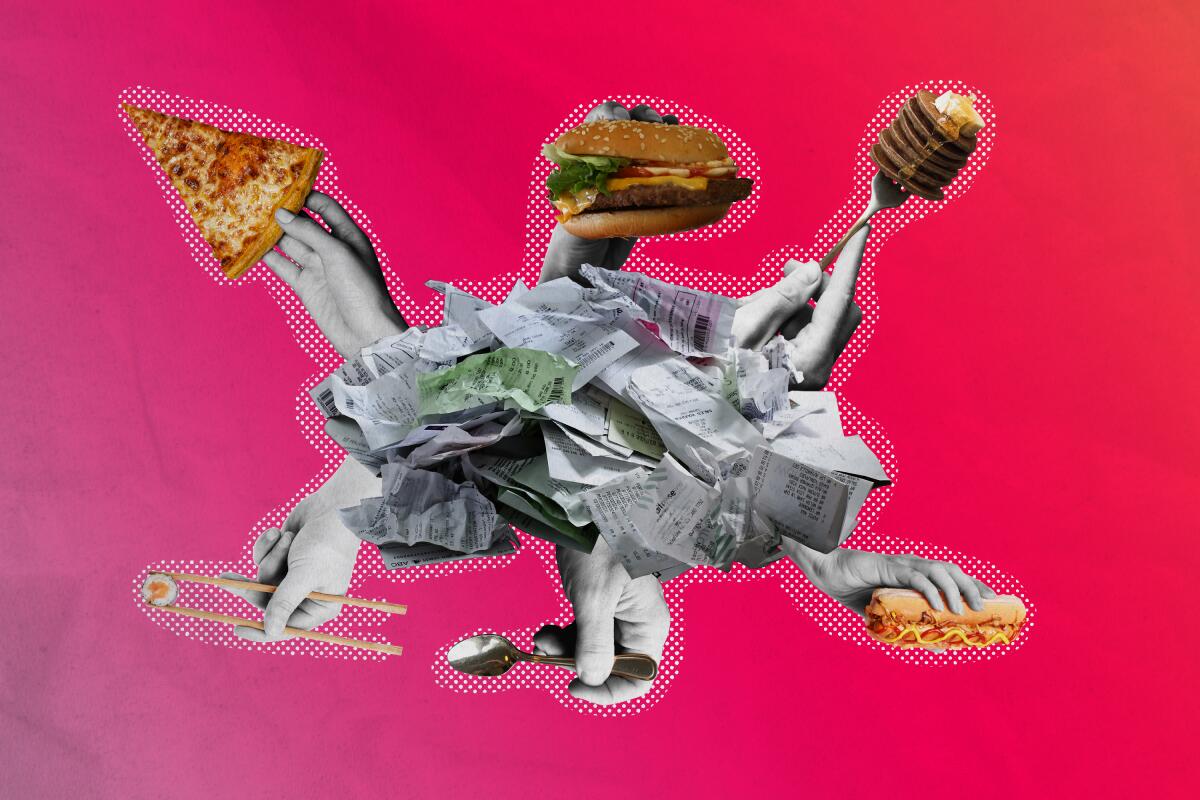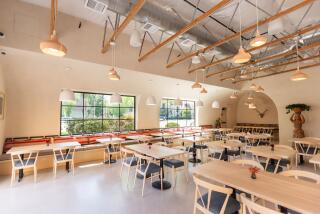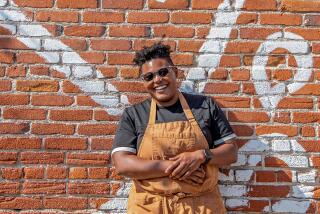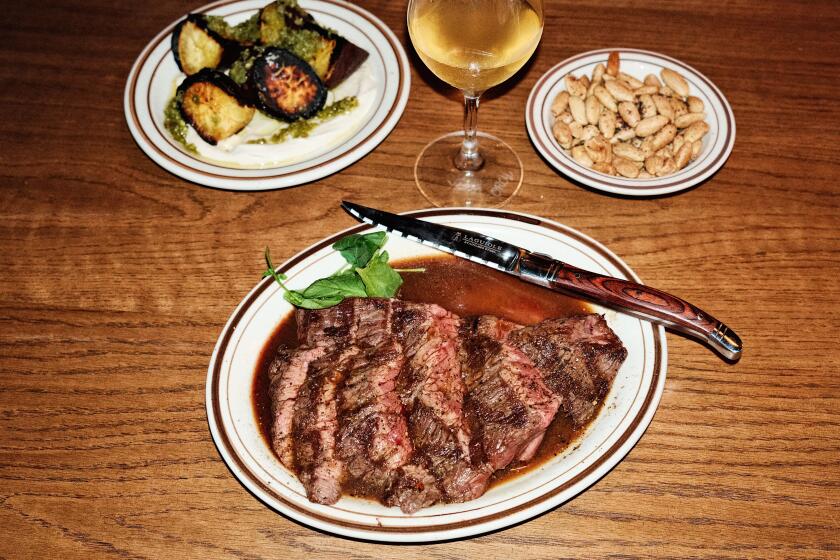L.A. restaurants struggle with a new form of dine-and-dash

Spoon by H, Yoonjin Hwang’s celebrated Korean restaurant in Fairfax, is closing. Business had been slow since the start of the pandemic, but last summer, Hwang said, she started to notice more people disputing charges and claiming missing items through delivery apps. The restaurant was bleeding money and she was spending hours on the phone with the people behind the apps, trying to dispute the chargebacks.
“We lost orders, time, precious ingredients, and the problems accumulated to the point where we just couldn’t stay in business anymore,” she said. “We’re losing money to these issues, despite all the evidence we provide.”
Spoon by H is one of a growing number of Los Angeles restaurants dealing with customers attempting new ways to dine and dash during the pandemic. Scammers are taking advantage of restaurants that have prioritized safety over in-person security measures such as checking driver’s licenses and manually swiping credit cards. Some people are scamming restaurateurs with fraudulent credit cards, while others request refunds, claiming they never received part or all of an order.
One of the worst incidents for Spoon by H happened on Nov. 10, when a customer placed an online order for four “meat lovers” combo meals. It was one of the largest orders Hwang had ever received. The meals were elaborate and each included a galbijjim and oxtail tray, spicy beef japchae and a beef short rib rice cake soup.
The total was $728.76.
The order was placed through the Tock platform for pickup on Nov. 18. Hwang noticed the customer did not include his vehicle information (make and model of the car) on the order form, her standard procedure since switching exclusively to curbside takeout and delivery during the pandemic. She texted the customer directly and he didn’t respond. But Hwang, happy to receive such a large order, wasn’t alarmed.
“I was so grateful for the business,” she said. “I thought it must be because of the holiday season.”
On Nov. 18, at around 4:45 p.m., a man knocked on the door of the restaurant and gave the name on the order. Hwang, who is usually cooking in the kitchen, was waiting to greet the customer. With such a large order, she wanted to thank him personally for his business.
He offered to take the food to his car, but Hwang explained that it was far too much for one person to carry, and she grabbed a few bags herself.
“I asked him why he didn’t give us his vehicle information so that he could just stay in his car, but he didn’t say anything,” she said. “I thought he was an older Asian man like my dad, and that maybe, like my dad, he just wasn’t very talkative.”

They walked down the block to a white van and loaded the food into the vehicle.
“I asked him if there was a big party for such a big order,” she said. “He told me that it was his boss’ baby’s birthday party. I said, ‘Thank you so much for your support.’ He didn’t respond.”
On Nov. 25, Tock sent Hwang an email letting her know the customer was disputing the $728.76 charge and the payment had been temporarily removed from her account. The reason for the dispute was listed as “other fraud card absent” (the real cardholder said someone else used their credit card number).
Hwang sent photo evidence of the customer’s order confirmation and photos of the food to Visa. Then she waited two months. In January, Tock let her know that she had lost her appeal and that she was responsible for the $728.76.
“Despite presenting supporting evidence, the issuing card company often sides with the consumer, even in cases that may be fraudulent,” the Tock message stated.
After the incident in November, Hwang started taking videos of every order pickup and requiring all customers to show their driver’s licenses. She also started taking photos of every order.
“Some people order two things and say that they only got one item, so we had to start taking photos,” she said. “When I send them the photo, they [then] claim they found the other item in the car.”
But none of these new safety measures was enough to offset the amount of money she was still losing. She plans to close the restaurant by the end of February.
“It took a huge toll on me mentally, because I found myself becoming more skeptical of large orders,” she said. “It pains me to think that I would grow so suspicious of our customers, and that is not how I want to do business.”
Nationwide, the dollar amount of attempted fraudulent credit card charges increased by 35% in April 2020 from a year before, according to Fidelity National Information Services Inc., which monitors banking fraud.
Koko’s Mediterranean Cafe owner Shant Bogharian said he started to notice more people claiming missing order items and requesting refunds through third-party food ordering and delivery services about two months ago. The largest refund request was for more than $140. Bogharian said the reason given for the refund requests is often “change of plans.”
“It’s insane that someone tries to get a refund maybe 10 minutes after they pick up the order,” he said. “It’s insulting. We just went through the effort to make the food for this person, they picked it up, then they ask for a refund.”
Hwang also has had numerous issues with people claiming missing food or the wrong items. On a Postmates order, a customer requested a full refund for one of the restaurant’s dosiraks. The customer claimed she was given the wrong size. The only problem? The dosirak comes in a single size. Hwang sent a photo of the order to Postmates and explained the sizing. She was promptly reimbursed.
While some apps such as DoorDash allow restaurants to press a button once an order has been picked up, others only have an option to confirm that the order is ready. Bogharian said having a way to confirm a pickup on both the merchant and customer side would be helpful. While he said he has successfully disputed some of the claims through the third-party food services, he noted that it takes more than three days for them to credit his account, while customers usually are given refunds instantaneously. And when the services refund money to customers, the restaurants foot the bill.
To safeguard against scammers who order directly, Bogharian no longer takes payment via credit card over the phone.
Fern Kaewtathip, who co-owns Luv2Eat Thai Bistro in Hollywood, said every month, she gets about three to six customers who claim they never received their order through third-party partners. She estimates the restaurant lost at least a few thousand dollars last year to disputed charges but adds that disputing chargebacks is easier with the third-party partners than with the credit card companies.
“Last year our credit card sales dropped by 80% because they were replaced by third-party companies,” Kaewtathip said. “We pay commission but at least we don’t have the risk of lost orders.”
Kaewtathip now requires that customers show ID and sign for all large orders made over the phone. But sometimes, she said, especially if it’s busy, it’s hard to check everyone’s ID.
Eddy Shin, chef-owner of A Cut Above butcher shop in Santa Monica, ascribes the uptick in fraud and scams to opportunities created by the pandemic. As part of the shop’s COVID-19 protocols, Shin is not allowing customers inside the store and is taking orders only by phone or online.
“People are desperate and we need the business, so when someone puts in a big order, [the business is going] to take it,” said Shin. “You think, ‘Oh my God, it’s too good to be true,’ then you find out it’s a total scam.”
On Jan. 6, a customer placed an order for $600 worth of meat over the phone. It was a large order but Shin and shop manager Alice Mackenzie said they were not suspicious. They often work with private chefs who place large orders. There was trouble with the credit card, and the customer had to call back a few times before the charge went through.
“We are used to working with private chefs that may have households, and they sometimes have multiple cards,” Mackenzie said. “This didn’t really raise any alarms.”
The next day, the customer picked up the food. Later that week, the same person placed an order for $1,300 worth of meat using a different card. He picked the order up the next day.
A few weeks later, Mackenzie and Shin received a notice from their credit processor that both the $600 and $1,300 charges were being disputed. They were given the option to contact the cardholder directly to fight the chargeback but, in an effort to protect sensitive customer information, Mackenzie said she was “trashing out” credit card information almost nightly.
Without a way to contact the customer directly, Shin and Mackenzie filed a report with the Santa Monica Police Department at the end of January. They also implemented new policies to try to prevent something similar from happening again. They now flag any large purchase from a new customer and require that person come into the store and present the credit card to charge in person.
“It’s a very expensive lesson,” Mackenzie said.
“It’s disheartening,” added Shin. “But if there’s some kind of loophole or some kind of weakness in the security, people will find a way to take advantage of it.”
More to Read
Eat your way across L.A.
Get our weekly Tasting Notes newsletter for reviews, news and more.
You may occasionally receive promotional content from the Los Angeles Times.








